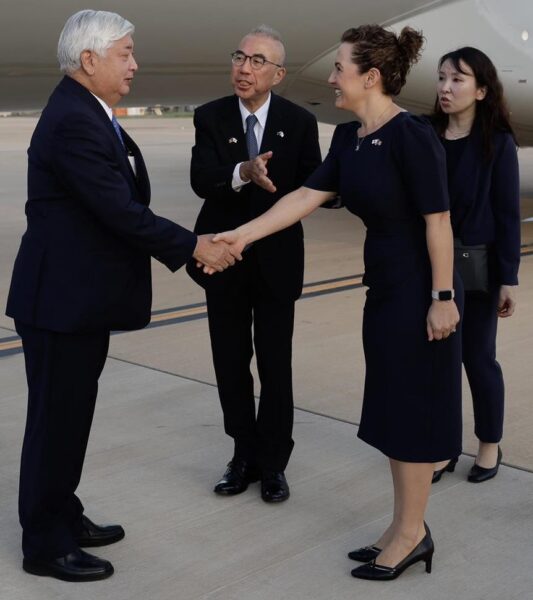Photo: ANDREW KACIMAIWAI
The decision was announced by Australian Deputy Prime Minister and Minister for Defence Richard Marles, Japanese Minister of Defence Nakatani Gen and outgoing US Secretary of Defence Lloyd Austin III.
They made the announcement after the 14th Trilateral Defence Ministers meeting (TDMM) which was held last Sunday (November 17) in Darwin.
“We reaffirm our continuing commitment to the complete denuclearisation of the Korean Peninsula …” Austin said.
“We express serious concern for Indo-Pacific and Euro-Atlantic security following reports of the transfer of ballistic missiles and other materiel to Russia from third countries … and the deployment of North Korean troops to Russia.”
Austin urged Russia to immediately withdraw from Ukraine and asked other countries like China not to support President Vladimir Putin.
“These developments have destabilising consequences for the Indo-Pacific and Euro-Atlantic regions,” he said.
MORE: The race to develop hypersonic weapons
The ministers also took aim at China’s belligerence in the South China Sea as that country attempts to claim the waters for itself.
“We reiterate our serious concern about destabilising actions in the East and South China seas, including dangerous conduct by …. China against Philippines and other coastal state vessels,” Marles said.
“We reiterate our strong opposition to any unilateral attempts to change the status quo by force or coercion,” he said.
All three ministers reaffirmed the rights and freedom of the UN Law of the Sea.
“We emphasize the importance of peace and stability across the Taiwan Strait and call for the peaceful resolution of cross-Strait issues,” Gen said.
The ministers said the countries “strongly condemn” North Korea’s destabilising activities, including its ballistic missile launches and its intercontinental missile test on October 31.
THREE NATIONS
The ministers also announced a series of steps to increase military co-operation between their countries but also involving India and Papua New Guinea.
Annual amphibious training between Australian and US troops in the Top End will involve more Japanese military.
Japan will also join in Aussie-US training exercises like Southern Jackaroo and Talisman Sabre while Australia will take part in Japan-US exercises in Japan such as Orient Shield.
The three armed forces are to increase intelligence, surveillance and reconnaissance co-operation in the region with reciprocal deployments of combat aircraft to all three countries from next year.
They agreed to strengthen regional deterrence, partly by ‘networking’ air and missile defences starting with a live-fire event due to be held during Exercise Talisman Sabre 2027.
A Japanese Joint Staff Liaison Officer is to be appointed to the ADF Joint Operations Command (JOC) this month with an Australian liaison officer due to join a Japanese JOC once it’s established in 2025.
The ministers said their forces will also work more with the Philippines military in the South China Sea such as regular marine patrols, having already conducted joint aerial patrols with India.
MORE STORIES:
Australia to boost domestic munitions capability
New $7bn deal for US long-range missiles
NORTHERN TERRITORY
Northern Territory Chief Minister Lia Finocchiaro welcomed news of the Japanese military’s expanded involvement.
She personally greeted Japanese Defence Minister Nakatani Gen on the tarmac upon his arrival at Darwin last weekend on his first visit to Australia.
“The Territory supports Japan’s commitment to increase training and interoperability with our ADF and (US) Marine Rotational Force Darwin,” Finocchiaro says.
The US Marines maintains a base in the Top End.

“This agreement reinforces our strategic importance in the region … the acting prime minister and I are united in how important Darwin is as a strategic resource to our nation’s defence, and to secure a commitment by the Japanese is welcome,” Finocchiaro says.
Defence activity accounts for nine per cent of the Northern Territory’s economic activity, according to the NT government.
“The Territory is a critical defence and national security hub and a critical enabler of Defence capability in the region and is an essential bridge to the Indo-Pacific,” Finocchiaro says.
MORE TOMORROW: Top US military commander’s shares his thoughts on China






